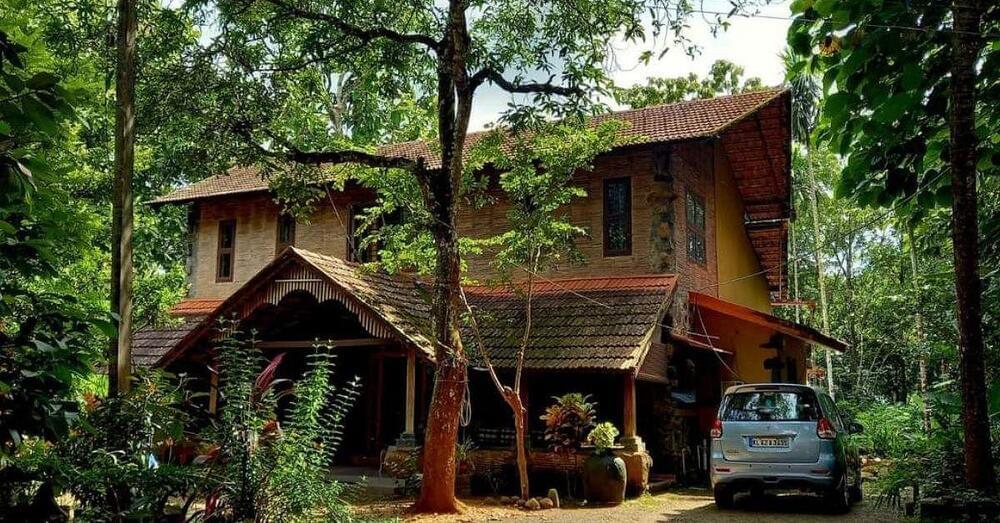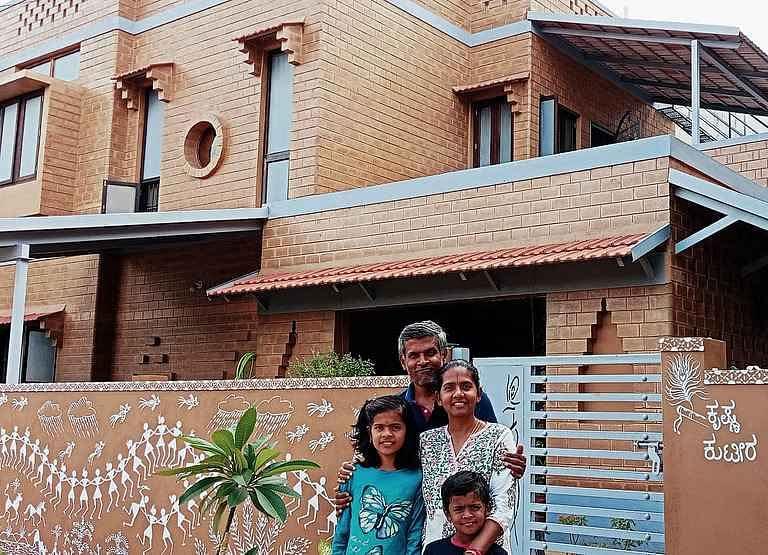Laya Joshua from Kerala has used stones, old wood, and many such eco-friendly elements to build her dream sustainable home, for which no trees were cut.



One afternoon in the fall of 2019, in a grand old office building near the Arc de Triomphe, I was buzzed through an unmarked door into a showroom for the future of surveillance. The space on the other side was dark and sleek, with a look somewhere between an Apple Store and a doomsday bunker. Along one wall, a grid of electronic devices glinted in the moody downlighting—automated license plate readers, Wi-Fi-enabled locks, boxy data processing units. I was here to meet Giovanni Gaccione, who runs the public safety division of a security technology company called Genetec. Headquartered in Montreal, the firm operates four of these “Experience Centers” around the world, where it peddles intelligence products to government officials. Genetec’s main sell here was software, and Gaccione had agreed to show me how it worked.
He led me first to a large monitor running a demo version of Citigraf, his division’s flagship product. The screen displayed a map of the East Side of Chicago. Around the edges were thumbnail-size video streams from neighborhood CCTV cameras. In one feed, a woman appeared to be unloading luggage from a car to the sidewalk. An alert popped up above her head: “ILLEGAL PARKING.” The map itself was scattered with color-coded icons—a house on fire, a gun, a pair of wrestling stick figures—each of which, Gaccione explained, corresponded to an unfolding emergency. He selected the stick figures, which denoted an assault, and a readout appeared onscreen with a few scant details drawn from the 911 dispatch center. At the bottom was a button marked “INVESTIGATE,” just begging to be clicked.

Nature, red in tooth and claw, is rife with organisms that eat their neighbors to get ahead. But in the systems studied by the theoretical ecologist Holly Moeller, an assistant professor of ecology, evolution and marine biology at the University of California, Santa Barbara, the consumed become part of the consumer in surprising ways.
Moeller primarily studies protists, a broad category of unicellular microorganisms like amoebas and paramecia that don’t fit within the familiar macroscopic categories of animals, plants and fungi. What most fascinates her is the ability of some protists to co-opt parts of the cells they prey upon. Armed with these still-functioning pieces of their prey, the protists can expand into new habitats and survive where they couldn’t before.

Urcdkeys Christmas Sale.
25% off code: C25
Win10 pro key($15):https://biitt.ly/pP7RN
Win10 home key($14):https://biitt.ly/nOmyP
Win11 pro key($21):https://biitt.ly/f3ojw.
office2021 pro key($60):https://biitt.ly/DToFr.
Affiliate links (I get a commission):
BUY an LG C1 OLED 48″: https://amzn.to/3DGI33I
BUY an LG C1 OLED 55″: https://amzn.to/3TTpQp9
Support me on Patreon: https://www.patreon.com/coreteks.
Buy a mug: https://teespring.com/stores/coreteks.
My channel on Odysee: https://odysee.com/@coreteks.
I now stream at:

Amid rising mortgage rates and surging housing prices, one company is betting that 3D printing homes is a solution to the affordable housing crisis. Nancy Chen takes a look.
#3Dprinting #News.
“CBS Evening News with Norah O’Donnell” delivers the latest news and original reporting, and goes beyond the headlines with context and depth. Catch the “CBS Evening News” weeknights at 6:30 p.m. ET on the CBS Television Network and at 10 p.m. ET on the CBS News app.
Watch full episodes of “CBS Evening News”: https://cbsn.ws/23XekKA
Follow “CBS Evening News” on Instagram: https://bit.ly/1T8icTO
Like “CBS Evening News” on Facebook: https://on.fb.me/1KxYobb.
Follow “CBS Evening News” on Twitter: https://bit.ly/1O3dTTe.
Download the CBS News app: https://cbsn.ws/1Xb1WC8
Try Paramount+ free: https://bit.ly/2OiW1kZ
For video licensing inquiries, contact: [email protected]
❤️ Check out Weights & Biases and sign up for a free demo here: https://wandb.com/papers.
❤️ Their mentioned post is available here: http://wandb.me/RLHF-OpenAI
Try #ChatGPT!
https://chat.openai.com/
https://openai.com/blog/chatgpt/
Our earlier paper with the translucent materials:
If you wish to read my latest paper on simulations that look almost like reality, it is available for free here:
https://rdcu.be/cWPfD
Or this is the orig. Nature Physics link with clickable citations:
https://www.nature.com/articles/s41567-022-01788-5
Tweet links:
40 SpaceX Starships are terraforming Mars. Slowly transforming the Martian atmosphere, water begins to flow on the surface. Building the foundation for long term Mars colonization.
Going beyond the ‘First 10,000 Days on Mars’ and 2050, this is a timelapse look into the future.
Humans are surviving on Mars underground, in a crater habitat. A deep crater is enclosed, creating a mini Earth that is open and breathable. Tunnel diggers dig into the sides of the crater, creating more space and connecting other craters, landing pads, and lava tubes to form an underground Mars colony network… In part, inspired by: Mars garden quote: The Expanse — Chrisjen Avasarala Living on Mars — TED Talk by Stephen Petranek • https://youtu.be/t9c7aheZxls Andy Weir (The Martian) — Conversations With Joe • https://youtu.be/4dgwnhFf_6Y — Building on Mars — Articles Join the newsletter to read my new articles about “Building on Mars.” Or you can view them at my website: www.vx-c.com. • From Dust to Structures: How to Create Concrete and Metal on Mars • The (Not So) Simple Act of Building on Mars: The Engineering Challenges of Constructing on the Red Planet — A terraforming sci-fi documentary, and a timelapse look into the future of Mars colonization. — Book recommendations from Elon Musk on artificial intelligence, Mars, future technology and innovations, and sci-fi stories (affiliate links): • Superintelligence: Paths, Dangers, Strategies https://amzn.to/3j28WkP • Life 3.0: Being Human in the Age of Artificial Intelligence https://amzn.to/3790bU1 • Our Final Invention: Artificial Intelligence and the End of the Human Era https://amzn.to/351t9Ta • The Foundation: https://amzn.to/3i753dU • The Hitchhikers Guide to the Galaxy: https://amzn.to/3kNFSyW — Other videos to watch: • TIMELAPSE OF FUTURE SPACECRAFT: 2025 — 3000+ https://youtu.be/RL74Jb4OU9U • NASA 1958 — 2100 (Timelapse of past & future technology) https://youtu.be/2qaDEt7PCMI • MOON BASE — THE FIRST 10,000 DAYS (Timelapse) https://youtu.be/XOhz7ZBZ_1U …
In part, inspired by:
Mars garden quote: The Expanse — Chrisjen Avasarala.
Living on Mars — TED Talk by Stephen Petranek.
• https://youtu.be/t9c7aheZxls.
Andy Weir (The Martian) — Conversations With Joe.
Austin, Texas-based 3D printing construction company ICON has gotten some pretty significant projects off the ground in recent years, from a 50-home development in Mexico to a 100-home neighborhood in Texas. This week the company won a NASA contract that will help it get an even bigger project much further off the ground—all the way to the moon, in fact.
The $57.2 million contract is intended to help ICON develop technologies for building infrastructure on the moon, like landing pads, houses, and roads. The goal is for ICON to build these lunar structures using local material—that is, moon houses built out of moon dust and moon rocks.